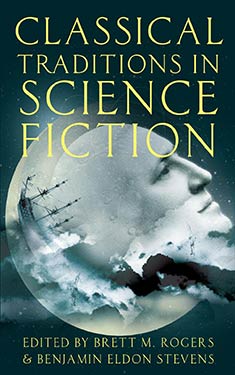Book Giveaway: Classical Traditions in Science Fiction Edited by Brett M. Rogers & Benjamin Eldon Stevens
It’s been some time since we last ran a book giveaway contest but we’re back now with a doozy. Instead of our typical fiction offering we’ve got something a little more highbrow for you this time: Classical Traditions in Science Fiction edited by Brett M. Rogers & Benjamin Eldon Stevens from Oxford University Press. CTSF is the first collection dedicated to the rich study of science fiction’s classical heritage, offering a much-needed mapping of its cultural and intellectual terrain. Told you it was highbrow.
We have 2 copies to give away: our first place winner will receive a hardcover copy, worth $89.10, and our second place winner will receive a paperback copy. As always, we’ve made it super easy to enter. All you have to do is re-tweet this tweet:
Book Giveaway: Classical Traditions in Science Fiction http://t.co/Cf3VSjT5ce Retweet for your chance to win! pic.twitter.com/Va0g3cCexd
— Worlds Without End (@WWEnd) January 26, 2015
or comment here in the blog and you’re in – easy peasy. Do both and double your chances! We’ll have a random drawing and announce the winners next Monday so tweet away and don’t forget to tell your friends.
So now you know about the contest I’ll leave it for Brett and Ben to tell you about their book.
 From its very beginning to its most recent moments, modern science fiction (SF) has looked back to Greek and Roman antiquity as a source of inspiration for ideas, images, and important questions. Classical Traditions in Science Fiction (CTSF) looks at some of the ways in which SF has looked to the future in part by looking back.
From its very beginning to its most recent moments, modern science fiction (SF) has looked back to Greek and Roman antiquity as a source of inspiration for ideas, images, and important questions. Classical Traditions in Science Fiction (CTSF) looks at some of the ways in which SF has looked to the future in part by looking back.
For example, Mary Shelley’s Frankenstein (1818), arguably the starting point of SF, is subtitled “Or, The Modern Prometheus,” referring to the ancient myth of the Titan who stole fire, a symbol of technology, and gave it to humankind. The subsequent punishment of both Prometheus and humankind in the myth, like the consequences for creator and creature in Shelley’s haunting novel, suggests that our relationship to technology is a complicated one: even as we are awestruck by what we can do, we are asked to wonder how science and technology may affect our humanity. (Frankenstein is discussed at length in CTSF chapter two, while Prometheus is treated in the introduction, excerpted here, and in a related post on OUPblog.)
Likewise, nearly two hundred years later, Suzanne Collins’ The Hunger Games Trilogy (2008-2010 as books, ongoing in films) asks how much we might give up so as to have access to technology of a different sort: in the pursuit of safety and security in society, are we sacrificing essential liberties? Collins invites us to ask this question by imagining a future version of the United States of America modeled on visions of ancient Imperial Rome, in which the ethically shallow excesses of a small libertine class are built on systems of oppressive, militaristic exploitation and control. Will our future thus resemble, in undesirable ways, the ancient past? (The Hunger Games are treated in CTSF chapter 13.)
In these two examples and many others, SF turns to ancient Greek and Roman mythology, literature, history, and art to raise questions about what it means to be human in an increasingly technoscientific world. At the deepest level, that connection matters because the methods by which we reconstruct the ancient past is much like how we speculate about the future: in both cases, we work to imagine a world in ways unlike our own… so as to see our own world, our present, more clearly.
We hope all of this is as fascinating to other readers of SF (and fantasy!) as it is for us. Check out the book, available now on sites like Amazon, Barnes & Noble, and iTunes; visit the book’s facebook page for excerpts, related events, and more; and attend our upcoming conference on “The Once and Future Antiquity,” March 27th-29th at the University of Puget Sound. We’re also very happy to answer questions and have conversations at classicalreceptions@gmail.com!
Our thanks to Brett and Ben and the folks at Oxford University Press for the opportunity to bring this exciting new work to our fans attention. Best of luck to everyone!



















 Full Details
Full Details




31 Comments
SHINY.
Oh, pretty please
This looks like something I’d enjoy.
I’d definitely squeeze this in between challenge books!!
Hardcover! count me in!
I have not come across this title in my non-fiction searching. I am very curious to study the nuances of what the editors have determined to be the foundational contributors to Science Fiction. Thank you for a very awesome give away and the chance to win. Cheers ~
This looks to be a very interesting read. I’m keenly interested in what the editors have included as the foundational contributors for Science Fiction.
Yep. Sign me up
Anything Roman, please!
Mmm, crunchy. Sounds like it will sit nicely beside Victoria Nelson’s “The Secret Life of Puppets” and Justine Larbelestier’s “The Battle of the Sexes in Science Fiction”.
Brett advised my undergraduate thesis! At the time he was hard at work on this project. It’s very exciting to see the work in its final form!
I love both scifi and Greek myth! And one of the reasons I read the Hunger Games was it seemed like a scifi version of the sacrifice of youths to the minotaur in the story of Theseus. This book looks so cool!
Great website and book giveaways= Purrfect!!!
Yeah! Great idea, guys.
Looks like a great read!
Looks like a book I need to either have or have my college have
looks interesting!
How exciting! Fingers crossed 🙂
Interesting indeed!
This should be a most interesting read.
So cool I’d even buy this one!
Oooh, this sounds like a fantastic read. Yes, please!
I’m in!
Yes please!
Out of habit with paper-based books (you know, BookBook TM), but It will fit perfectly on the Reference Shelf. In the meantime, if you haven’t watched the Alternate Reality TV Series Pilot by Ridley Scott, based on “The Man in the High Castle”, I would recommend it. Just don’t be purist about PKD – liberties are taken. http://amzn.to/1uTqZjL
Oh, I really need this book! I’d love to win!
Interested in what mythology has influenced current fiction. Is an ebook, ePub or mobi, planned?
The eBook is available on Kindle now. Paper comes out next week.
That book looks very interesting.
I hope I win !
I somehow just noticed this – I’d love to have a copy!
Sweet!
Sorry, the comment form is closed at this time.